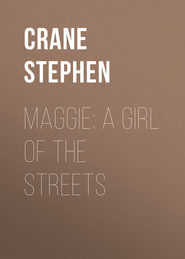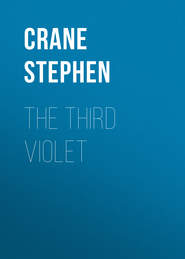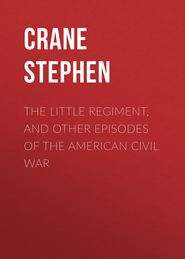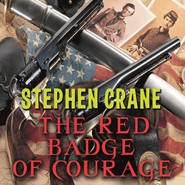По всем вопросам обращайтесь на: info@litportal.ru
(©) 2003-2025.
✖
The Red Badge of Courage: An Episode of the American Civil War
Настройки чтения
Размер шрифта
Высота строк
Поля
The friend, with a grievance in his eye, went to the youth. "I wonder what he does want," he said. "He must think we went out there an' played marbles! I never see sech a man!"
The youth developed a tranquil philosophy for these moments of irritation. "Oh, well," he rejoined, "he probably didn't see nothing of it at all and god mad as blazes, and concluded we were a lot of sheep, just because we didn't do what he wanted done. It's a pity old Grandpa Henderson got killed yestirday–he'd have known that we did our best and fought good. It's just our awful luck, that's what."
"I should say so," replied the friend. He seemed to be deeply wounded at an injustice. "I should say we did have awful luck! There's no fun in fightin' fer people when everything yeh do–no matter what–ain't done right. I have a notion t' stay behind next time an' let 'em take their ol' charge an' go t' th' devil with it."
The youth spoke soothingly to his comrade. "Well, we both did good. I'd like to see the fool what'd say we both didn't do as good as we could!"
"Of course we did," declared the friend stoutly. "An' I'd break th' feller's neck if he was as big as a church. But we're all right, anyhow, for I heard one feller say that we two fit th' best in th' reg'ment, an' they had a great argument 'bout it. Another feller, 'a course, he had t' up an' say it was a lie–he seen all what was goin' on an' he never seen us from th' beginnin' t' th' end. An' a lot more stuck in an' ses it wasn't a lie–we did fight like thunder, an' they give us quite a sendoff. But this is what I can't stand–these everlastin' ol' soldiers, titterin' an' laughin', an then that general, he's crazy."
The youth exclaimed with sudden exasperation: "He's a lunkhead! He makes me mad. I wish he'd come along next time. We'd show 'im what–"
He ceased because several men had come hurrying up. Their faces expressed a bringing of great news.
"O Flem, yeh jest oughta heard!" cried one, eagerly.
"Heard what?" said the youth.
"Yeh jest oughta heard!" repeated the other, and he arranged himself to tell his tidings. The others made an excited circle. "Well, sir, th' colonel met your lieutenant right by us–it was damnedest thing I ever heard–an' he ses: 'Ahem! ahem!' he ses. 'Mr. Hasbrouck!' he ses, 'by th' way, who was that lad what carried th' flag?' he ses. There, Flemin', what d' yeh think 'a that? 'Who was th' lad what carried th' flag?' he ses, an' th' lieutenant, he speaks up right away: 'That's Flemin', an' he's a jimhickey,' he ses, right away. What? I say he did. 'A jimhickey,' he ses–those 'r his words. He did, too. I say he did. If you kin tell this story better than I kin, go ahead an' tell it. Well, then, keep yer mouth shet. Th' lieutenant, he ses: 'He's a jimhickey,' and th' colonel, he ses: 'Ahem! ahem! he is, indeed, a very good man t' have, ahem! He kep' th' flag 'way t' th' front. I saw 'im. He's a good un,' ses th' colonel. 'You bet,' ses th' lieutenant, 'he an' a feller named Wilson was at th' head 'a th' charge, an' howlin' like Indians all th' time,' he ses. 'Head 'a th' charge all th' time,' he ses. 'A feller named Wilson,' he ses. There, Wilson, m'boy, put that in a letter an' send it hum t' yer mother, hay? 'A feller named Wilson,' he ses. An' th' colonel, he ses: 'Were they, indeed? Ahem! ahem! My sakes!' he ses. 'At th' head 'a th' reg'ment?' he ses. 'They were,' ses th' lieutenant. 'My sakes!' ses th' colonel. He ses: 'Well, well, well,' he ses. 'They deserve t' be major-generals.'"
The youth and his friend had said: "Huh!" "Yer lyin' Thompson." "Oh, go t' blazes!" "He never sed it." "Oh, what a lie!" "Huh!" But despite these youthful scoffings and embarrassments, they knew that their faces were deeply flushing from thrills of pleasure. They exchanged a secret glance of joy and congratulation.
They speedily forgot many things. The past held no pictures of error and disappointment. They were very happy, and their hearts swelled with grateful affection for the colonel and the youthful lieutenant.
Chapter 22
When the woods again began to pour forth the dark-hued masses of the enemy the youth felt serene self-confidence. He smiled briefly when he saw men dodge and duck at the long screechings of shells that were thrown in giant handfuls over them. He stood, erect and tranquil, watching the attack begin against apart of the line that made a blue curve along the side of an adjacent hill. His vision being unmolested by smoke from the rifles of his companions, he had opportunities to see parts of the hard fight. It was a relief to perceive at last from whence came some of these noises which had been roared into his ears.
Off a short way he saw two regiments fighting a little separate battle with two other regiments. It was in a cleared space, wearing a set-apart look. They were blazing as if upon a wager, giving and taking tremendous blows. The firings were incredibly fierce and rapid. These intent regiments apparently were oblivious of all larger purposes of war, and were slugging each other as if at a matched game.
In another direction he saw a magnificent brigade going with the evident intention of driving the enemy from a wood. They passed in out of sight and presently there was a most awe-inspiring racket in the wood. The noise was unspeakable. Having stirred this prodigious uproar, and, apparently, finding it too prodigious, the brigade, after a little time, came marching airily out again with its fine formation in nowise disturbed. There were no traces of speed in its movements. The brigade was jaunty and seemed to point a proud thumb at the yelling wood.
On a slope to the left there was a long row of guns, gruff and maddened, denouncing the enemy, who, down through the woods, were forming for another attack in the pitiless monotony of conflicts. The round red discharges from the guns made a crimson flare and a high, thick smoke. Occasional glimpses could be caught of groups of the toiling artillerymen. In the rear of this row of guns stood a house, calm and white, amid bursting shells. A congregation of horses, tied to a long railing, were tugging frenziedly at their bridles. Men were running hither and thither.
The detached battle between the four regiments lasted for some time. There chanced to be no interference, and they settled their dispute by themselves. They struck savagely and powerfully at each other for a period of minutes, and then the lighter-hued regiments faltered and drew back, leaving the dark-blue lines shouting. The youth could see the two flags shaking with laughter amid the smoke remnants.
Presently there was a stillness, pregnant with meaning. The blue lines shifted and changed a trifle and stared expectantly at the silent woods and fields before them. The hush was solemn and churchlike, save for a distant battery that, evidently unable to remain quiet, sent a faint rolling thunder over the ground. It irritated, like the noises of unimpressed boys. The men imagined that it would prevent their perched ears from hearing the first words of the new battle.
Of a sudden the guns on the slope roared out a message of warning. A spluttering sound had begun in the woods. It swelled with amazing speed to a profound clamor that involved the earth in noises. The splitting crashes swept along the lines until an interminable roar was developed. To those in the midst of it it became a din fitted to the universe. It was the whirring and thumping of gigantic machinery, complications among the smaller stars. The youth's ears were filled cups. They were incapable of hearing more.
On an incline over which a road wound he saw wild and desperate rushes of men perpetually backward and forward in riotous surges. These parts of the opposing armies were two long waves that pitched upon each other madly at dictated points. To and fro they swelled. Sometimes, one side by its yells and cheers would proclaim decisive blows, but a moment later the other side would be all yells and cheers. Once the youth saw a spray of light forms go in houndlike leaps toward the waving blue lines. There was much howling, and presently it went away with a vast mouthful of prisoners. Again, he saw a blue wave dash with such thunderous force against a gray obstruction that it seemed to clear the earth of it and leave nothing but trampled sod. And always in their swift and deadly rushes to and fro the men screamed and yelled like maniacs.
Particular pieces of fence or secure positions behind collections of trees were wrangled over, as gold thrones or pearl bedsteads. There were desperate lunges at these chosen spots seemingly every instant, and most of them were bandied like light toys between the contending forces. The youth could not tell from the battle flags flying like crimson foam in many directions which color of cloth was winning.
His emaciated regiment bustled forth with undiminished fierceness when its time came. When assaulted again by bullets, the men burst out in a barbaric cry of rage and pain. They bent their heads in aims of intent hatred behind the projected hammers of their guns. Their ramrods clanged loud with fury as their eager arms pounded the cartridges into the rifle barrels. The front of the regiment was a smoke-wall penetrated by the flashing points of yellow and red.
Wallowing in the fight, they were in an astonishingly short time resmudged. They surpassed in stain and dirt all their previous appearances. Moving to and fro with strained exertion, jabbering all the while, they were, with their swaying bodies, black faces, and glowing eyes, like strange and ugly fiends jigging heavily in the smoke.
The lieutenant, returning from a tour after a bandage, produced from a hidden receptacle of his mind new and portentous oaths suited to the emergency. Strings of expletives he swung lashlike over the backs of his men, and it was evident that his previous efforts had in nowise impaired his resources.
The youth, still the bearer of the colors, did not feel his idleness. He was deeply absorbed as a spectator. The crash and swing of the great drama made him lean forward, intent-eyed, his face working in small contortions. Sometimes he prattled, words coming unconsciously from him in grotesque exclamations. He did not know that he breathed; that the flag hung silently over him, so absorbed was he.
A formidable line of the enemy came within dangerous range. They could be seen plainly–tall, gaunt men with excited faces running with long strides toward a wandering fence.
At sight of this danger the men suddenly ceased their cursing monotone. There was an instant of strained silence before they threw up their rifles and fired a plumping volley at the foes. There had been no order given; the men, upon recognizing the menace, had immediately let drive their flock of bullets without waiting for word of command.
But the enemy were quick to gain the protection of the wandering line of fence. They slid down behind it with remarkable celerity, and from this position they began briskly to slice up the blue men.
These latter braced their energies for a great struggle. Often, white clinched teeth shone from the dusky faces. Many heads surged to and fro, floating upon a pale sea of smoke. Those behind the fence frequently shouted and yelped in taunts and gibelike cries, but the regiment maintained a stressed silence. Perhaps, at this new assault the men recalled the fact that they had been named mud diggers, and it made their situation thrice bitter. They were breathlessly intent upon keeping the ground and thrusting away the rejoicing body of the enemy. They fought swiftly and with a despairing savageness denoted in their expressions.
The youth had resolved not to budge whatever should happen. Some arrows of scorn that had buried themselves in his heart had generated strange and unspeakable hatred. It was clear to him that his final and absolute revenge was to be achieved by his dead body lying, torn and gluttering, upon the field. This was to be a poignant retaliation upon the officer who had said "mule drivers," and later "mud diggers," for in all the wild graspings of his mind for a unit responsible for his sufferings and commotions he always seized upon the man who had dubbed him wrongly. And it was his idea, vaguely formulated, that his corpse would be for those eyes a great and salt reproach.
The regiment bled extravagantly. Grunting bundles of blue began to drop. The orderly sergeant of the youth's company was shot through the cheeks. Its supports being injured, his jaw hung afar down, disclosing in the wide cavern of his mouth a pulsing mass of blood and teeth. And with it all he made attempts to cry out. In his endeavor there was a dreadful earnestness, as if he conceived that one great shriek would make him well.
The youth saw him presently go rearward. His strength seemed in nowise impaired. He ran swiftly, casting wild glances for succor.
Others fell down about the feet of their companions. Some of the wounded crawled out and away, but many lay still, their bodies twisted into impossible shapes.
The youth looked once for his friend. He saw a vehement young man, powder-smeared and frowzled, whom he knew to be him. The lieutenant, also, was unscathed in his position at the rear. He had continued to curse, but it was now with the air of a man who was using his last box of oaths.
For the fire of the regiment had begun to wane and drip. The robust voice, that had come strangely from the thin ranks, was growing rapidly weak.
Chapter 23
The colonel came running along the back of the line. There were other officers following him. "We must charge'm!" they shouted. "We must charge'm!" they cried with resentful voices, as if anticipating a rebellion against this plan by the men.
The youth, upon hearing the shouts, began to study the distance between him and the enemy. He made vague calculations. He saw that to be firm soldiers they must go forward. It would be death to stay in the present place, and with all the circumstances to go backward would exalt too many others. Their hope was to push the galling foes away from the fence.
He expected that his companions, weary and stiffened, would have to be driven to this assault, but as he turned toward them he perceived with a certain surprise that they were giving quick and unqualified expressions of assent. There was an ominous, clanging overture to the charge when the shafts of the bayonets rattled upon the rifle barrels. At the yelled words of command the soldiers sprang forward in eager leaps. There was new and unexpected force in the movement of the regiment. A knowledge of its faded and jaded condition made the charge appear like a paroxysm, a display of the strength that comes before a final feebleness. The men scampered in insane fever of haste, racing as if to achieve a sudden success before an exhilarating fluid should leave them. It was a blind and despairing rush by the collection of men in dusty and tattered blue, over a green sward and under a sapphire sky, toward a fence, dimly outlined in smoke, from behind which sputtered the fierce rifles of enemies.
The youth kept the bright colors to the front. He was waving his free arm in furious circles, the while shrieking mad calls and appeals, urging on those that did not need to be urged, for it seemed that the mob of blue men hurling themselves on the dangerous group of rifles were again grown suddenly wild with an enthusiasm of unselfishness. From the many firings starting toward them, it looked as if they would merely succeed in making a great sprinkling of corpses on the grass between their former position and the fence. But they were in a state of frenzy, perhaps because of forgotten vanities, and it made an exhibition of sublime recklessness. There was no obvious questioning, nor figurings, nor diagrams. There was, apparently, no considered loopholes. It appeared that the swift wings of their desires would have shattered against the iron gates of the impossible.
He himself felt the daring spirit of a savage, religion-mad. He was capable of profound sacrifices, a tremendous death. He had no time for dissections, but he knew that he thought of the bullets only as things that could prevent him from reaching the place of his endeavor. There were subtle flashings of joy within him that thus should be his mind.
He strained all his strength. His eyesight was shaken and dazzled by the tension of thought and muscle. He did not see anything excepting the mist of smoke gashed by the little knives of fire, but he knew that in it lay the aged fence of a vanished farmer protecting the snuggled bodies of the gray men.
As he ran a thought of the shock of contact gleamed in his mind. He expected a great concussion when the two bodies of troops crashed together. This became a part of his wild battle madness. He could feel the onward swing of the regiment about him and he conceived of a thunderous, crushing blow that would prostrate the resistance and spread consternation and amazement for miles. The flying regiment was going to have a catapultian effect. This dream made him run faster among his comrades, who were giving vent to hoarse and frantic cheers.
But presently he could see that many of the men in gray did not intend to abide the blow. The smoke, rolling, disclosed men who ran, their faces still turned. These grew to a crowd, who retired stubbornly. Individuals wheeled frequently to send a bullet at the blue wave.
But at one part of the line there was a grim and obdurate group that made no movement. They were settled firmly down behind posts and rails. A flag, ruffled and fierce, waved over them and their rifles dinned fiercely.
The blue whirl of men got very near, until it seemed that in truth there would be a close and frightful scuffle. There was an expressed disdain in the opposition of the little group, that changed the meaning of the cheers of the men in blue. They became yells of wrath, directed, personal. The cries of the two parties were now in sound an interchange of scathing insults.
They in blue showed their teeth; their eyes shone all white. They launched themselves as at the throats of those who stood resisting. The space between dwindled to an insignificant distance.
The youth had centered the gaze of his soul upon that other flag. Its possession would be high pride. It would express bloody minglings, near blows. He had a gigantic hatred for those who made great difficulties and complications. They caused it to be as a craved treasure of mythology, hung amid tasks and contrivances of danger.
He plunged like a mad horse at it. He was resolved it should not escape if wild blows and darings of blows could seize it. His own emblem, quivering and aflare, was winging toward the other. It seemed there would shortly be an encounter of strange beaks and claws, as of eagles.












